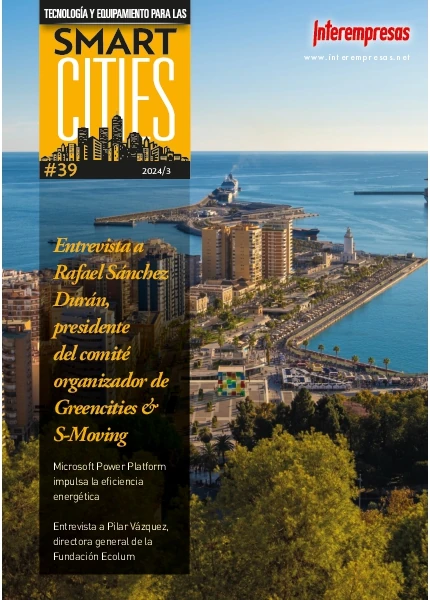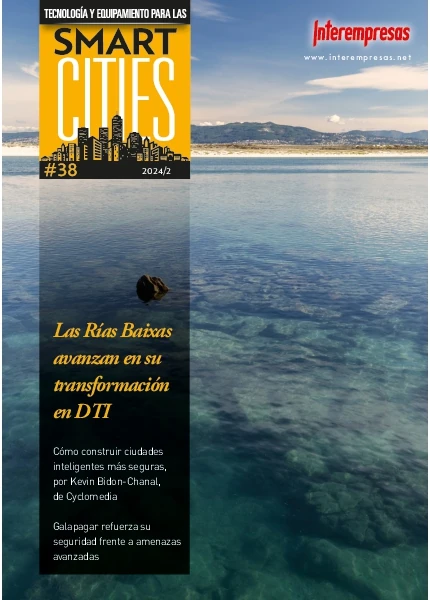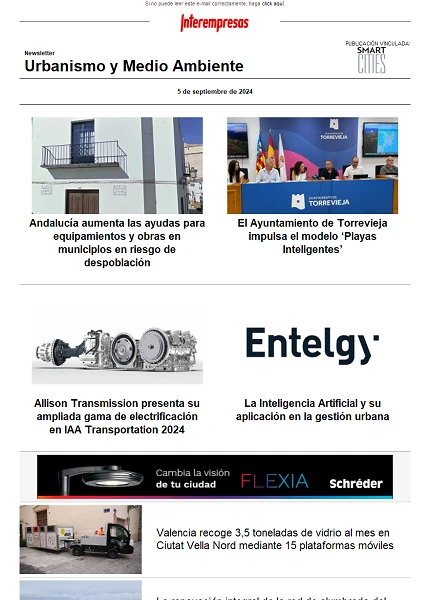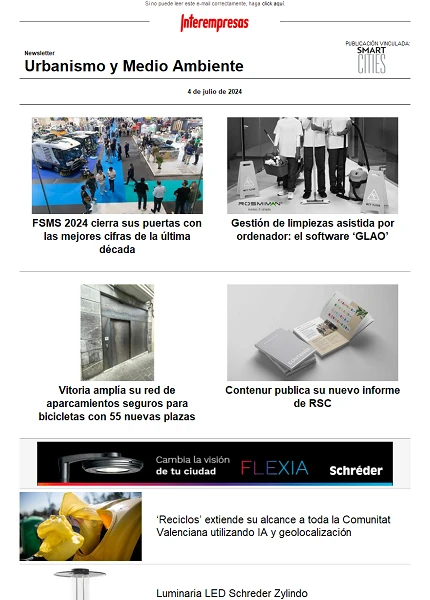1,59 euros by m3 is the half price of the water of domestic use (services of supply and saneamiento)
The prices that pays the user do not cover the costs of the services of urban water
The Spanish Association of Supplies of Water and Saneamiento (
Roque Gistau, president of Aeas, signals that “Spain has some services of water of first line, equiparables to the best of the world because the companies of supply and saneamiento of our country use the best available technologies and advance continuously to a better service to the citizen, that understands the need of a sustainable management but to the that costs him assume that this comports a greater economic effort that it has to be repercutido in the price”.

José Luis González Vallve, general director of AGA, remembers that “in the European classifications, the Services of the Urban Water in Spain are in the first places of the rankings of quality, price, regularity in the supply, etc., a big satisfaction for the country since in other urban services does not occur the same”.
Finally, Fernando Morcillo, general director of Aeas, stands out “that in the last years, the Spanish society has realizar a big effort -with the European budgetary help- to endow of infrastructures of purification of waste water, assuming the citizen his costs of operation, this advance supposes an enormous jump of quality attained with increases of half prices so moderate that are underneath of the IPC”.
In Spain, the urban services of water are municipal competition and each local entity can have prices and structures tarifarias distinct. The data of the study obtain of municipalities, Autonomous Communities and operators of the services of supply and saneamiento. In this edition have used data of 224 systems of supply that loan service in 505 municipalities to almost 30 million inhabitants. The price of the water varies in function of the consumption, by what considers an user type for domestic consumption and for industrial consumption.
The management of the integral cycle of the water includes the supply (from the catchment until it arrives to the tackled and counters), and the saneamiento (commissions of the residual water used and to debug it and give it back to his natural course respecting the environingingment).
The Spaniards pay 1,59 € by m3 of water for domestic use
According to the study, the half price of the water for domestic use is of 1,59 €/m3, of the that 0,92 € correspond to the service of supply and 0,67 € to the of saneamiento (sewerage and purification of waste water), without including VAT. With a cubic metre of water, that costs little more than euro and half, can ducharnos daily 3 weeks or give us 7 bathrooms or put 50 times the dishwasher, or 20 times the washing machine or also could wash the car until 10 times.
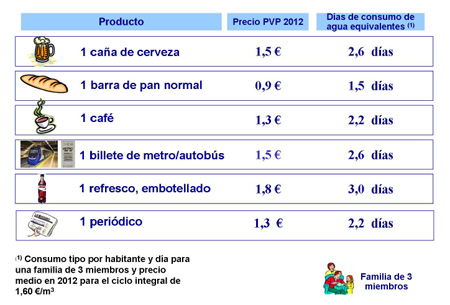
Comparison of the cost in water with other typical consumptions in a family.
That is to say, that by 1,59 €, have in our house of 1.000 litres of drinkable water (92 cents by supply) and, besides, ensure us that after having them used give back to the half aquatic respecting the environingingment (67 cents by saneamiento). The half price of 1,59 €/m3 supposes 4,89% of annual increase accumulated in relation to the results of the previous study (data 2010). According to the INE, a Spanish family spends of average 0,78% of his annual budget in the receipt of water, whereas his cost in telephone supposes him almost 3%, and the same for electricity.
In absolute values, each home disburses to the year hardly 220 € by the services of water in front of the 840 € by the telephone (pay four times more in telephone that in services of water). With what costs us a cane of beer us duchamos daily during 3 weeks and with a coin of 1 cent of euro can buy 6 litres of water (25 glasses).
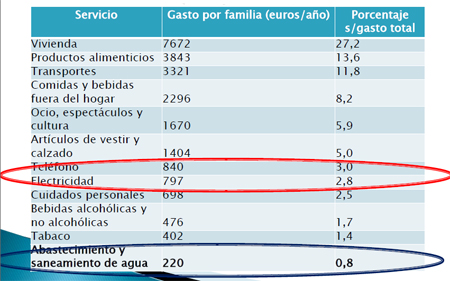
The water in the familiar budgets (INE, 2012).
The domestic consumption (water for consumption in the home, wash, ducharse, wash, throw of the chain, irrigate the plants…) is of 122 litres inhabitant/day, quantity by which pay some 20 cents of euros, less than what costs a litre of water bottled.
Regarding the half price for the integral cycle of the industrial use is of 2,07 €/m3 (VAT no included).
The efficient management and the rational consumption do that the bill of the water evolve underneath of IPC
But the reference of the increase of the price of the water in cubic metres results little significant to the hour to analyse the evolution of what the citizen pays really by the service. The domestic user tends to an increasingly reasonable consumption –a need assumed socially-, and pay by a service, more than by a product. Like this, although it increases slightly the price of the m3, the cost by family compensates in the bill by the gradual decrease of the consumption, resulted of the greater awareness of the user and the efficiency in the provision of the services.
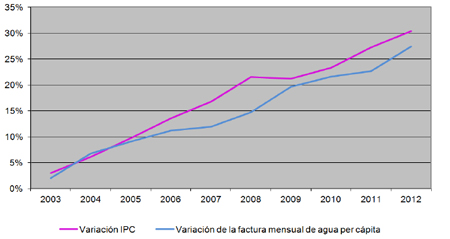
The familiar bill of the water keeps underneath of the IPC.
The constant descent of litres consumed by inhabitant and day is resulted of the greater efficiency of the services, greater citizen awareness supported by the informative campaigns of the operators, better domestic equipment, turnover by uses divided and generalisation of the progressive prices, increasing according to blocks of greater consumption.
All this does that the increase of the real bill of water for an user type, in the last 10 years, was underneath of the IPC.
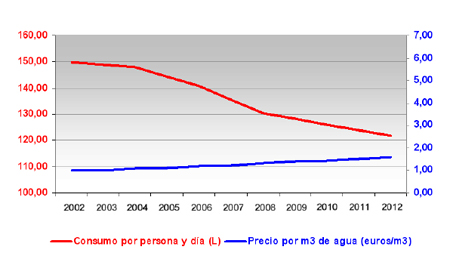
Evolution of the consumption and of the unitary price of the water.
The prices that pay the users do not cover the costs of the services of urban water
Apparently positive for the citizen, the situation is unsustainable on a long-term basis. The society sues improvement of the service; it requires a total coverage of the purification of the waste water and grow the European requirements in environingingmental and sanitary ware matter. The European politics orients to the coverage of the costs of the services and to that each user assume the charge that corresponds him to attend these costs in a rational distribution without forgetting the basic principle of ‘which contaminates pay'.
The citizen applauds the need of a sustainable management of the service of water, but this would have to suppose that it assume a greater economic effort. In Spain, the prices that pay the users do not cover the costs of the services of water preventing do the necessary investments in the heritage hídrico and of hydraulics and aquatic services.
The powerful character and complex of these infrastructures concedes them some inertia but is indispensable the good maintenance and his update beside an intelligent exploitation so that they follow loaning with efficiency his functions.
For a sustainable development, the efficient management of the water in the urban fields, agricultural, industrial and environingingmental is fundamental and only like this will be possible to bequeath to the coming generations a world habitable and some services of basic water for the life, that are the obstinacy of the sector.
Half prices of the water in €/m3 for domestic use by provinces and Autonomous Communities
Although the half price in Spain of the water for domestic use is in 1,59 €/m3, there is important differences between provinces and Autonomous Communities.
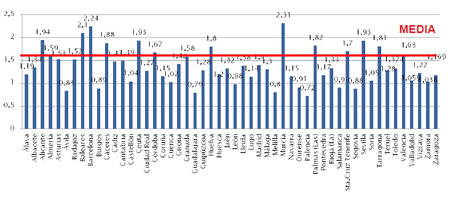
The differences between geographic areas obey to factors of availability, quality, vicinity of the resources hídricos, processes, technical and necessary costs for the potabilización and purification of the water, but also to the incorporation of the different autonomic canons.
The greater or lower coverage of the costs (costs of operation and of improvement and renewal of infrastructures) in each system contribute to generate, likewise, important differences in the prices that pays the final user.
By Autonomous Communities, the half values of price (without including VAT) for domestic uses can be still in the following table.
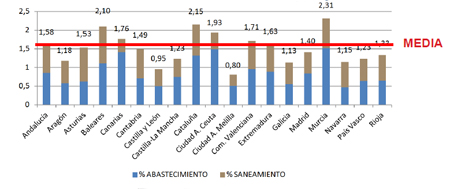
Price of the water for domestic supply by Autonomous Communities (euros/m3).
The price of the water in some European cities
In contrast with the data of the communities and Spanish provinces, the European cities pay some prices considerably higher by the service of the urban water. We can compare the 1,22 €/m3 of Bilbao with the 5,28 €/m3 of Glasgow or the 4,69 €/m3 of There Is It or 4,63 €/m3 of Berlin.
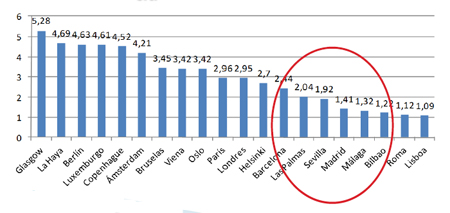
Price of the water in some European cities (euros / m3).
The sector alerts of new canons, that affect to the price but that no always go allocated to the water
The apparition of new figures impositivas that influence in the price that pays the final user concerns seriously to the sector. Although it designates them to him ‘canon of saneamiento or of the water', like the already existent in some destined autonomous communities to infrastructures or services, these new heterogeneous taxles expand the brecha of prices between users and record consumptions on which the operators can not act. The autonomic public inland revenues have capacity to legislate on environingingmental taxles, but these new figures that do not correspond to the service of the water go in in the bill like an item more without being clear where employ .
The Directives 91/271, 2000/60, Marco of the Water, and his transpositions, imposed the generalisation of the purification of the waste water. The lower resources of the municipal economies and the difficulty to access to European bottoms to build infrastructures, have promoted to the autonomous communities to assume the construction and/or the exploitation of the systems of purification. For this, implanted canons of saneamiento that make possible the payment, -through the bills of the water that manage the operators of supply- of economic resources for sufragar the operation and, partially, the infrastructures of purification.
Is a logical process, to try fulfil the aims of the DMA, to recover the costs of all the cycle. But lately this logic has diverted of his primary end and have appeared autonomic norms with measures tributarias on the water that treat to compensate budgetary disequilibriums, no always strictly associated to the service, and that repercuten to the final user with the result of an encarecimiento of the services. The sector comes requesting that it apply the economic criterion -included in the philosophy of the European Union- defined in the Directive Mark of the Water of the 2000 and that expresseses that the price of the services reach the ‘coverage of costs' that requires his provision. This condition has not reached in many of the services and however now appear these figures tributarias of doubtful transparency for the citizen, that do not seem to be the best procedure to advance in the sustainable management of the water.

